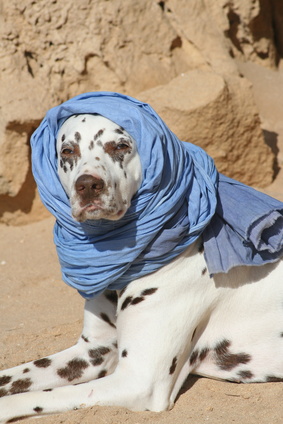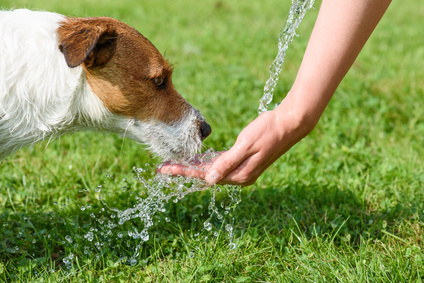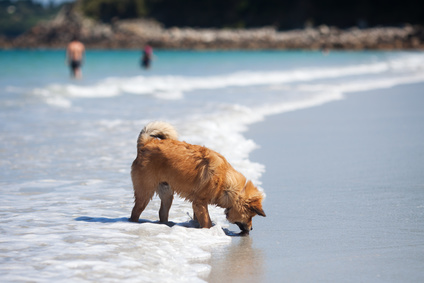
Small summer quiz !
The long-awaited summer is finally here with its holidays and its climate so pleasant ! Here is a little quiz on animals and summer, quiz answer questions you may be asking who will help you to better live the summer.

A dog can get sunburn
Although their skin is better protected than our own through their coat, dogs can catch sunburn by prolonged exposure. Dogs whose bristles are flush, sparse or whites are more susceptible than others to sunburn. Similarly, areas where bristles are less dense as the belly, the inside of the legs, ears or nose are more exposed.
During sunburn, the skin of the animal becomes dew, or red, optionally touch-sensitive. As with humans, UV increases the risk of skin cancer. The best prevention is to avoid exposure. The application of sunscreens with high SPF is recommended on the most sensitive areas when exposure is unavoidable.
There are protective creams specifically designed for animals. So when you think of sun protection you and your children, also think your dog !
⇒ It is therefore true !
An animal can suffer from heat stroke only if left in the sun
Heat stroke is an abnormal rise in body temperature as a result of a too hot environment. It is caused by excessive heat and not by direct sunlight. When it is hot, a dog can therefore undergo the same heat stroke by staying in the shade. This risk is even more important in the confined atmosphere of a car.
The fact that dogs and cats little sweat makes them particularly susceptible to heat stroke. Indeed, sweating is one way for an organization to regulate its temperature. Or, dogs and cats have few sweat glands. These glands are present mainly in a small area between the pads but are not sufficient to regulate their temperature when it is very hot. Only the breathing then allows d & rsquo; ensure thermoregulation in animals (that is why they pant when they are hot) and that thermoregulation is less efficient than humans.

When the temperature of an animal exceeds 40-41 ° C, it becomes dangerous. Other symptoms, associated with hyperthermia and the occurrence of a stroke : panting very marked, salivation, agitation and evolution of neurological disorders with decreased alertness, motor difficulties and possible loss of knowledge and / or onset of seizures. Heat stroke can quickly lead to animal death.
Prevention, do not leave your pet in a car (even in the shade and with open windows) or make exercise in hot. If you're hot and you sweat, keep in mind that your pet suffers even more heat you !
⇒ This statement is false.
It is particularly monitor renal impairment animals and / or heart summer

Animals suffering from kidney failure or heart failure are, Indeed, particularly vulnerable in summer.
On the one hand, when the outside temperature rises, the risk of dehydration also increases, which is detrimental in both pathologies. Although animals do not sweat or little, water loss is still increased, especially in the form of water vapor in exhaled air. Or, Dehydration leads to decreased blood flow in various organs, including the kidneys and heart, this dehydration that may cause acute decompensation.
On the other hand, in hot, cardiac rhythm accelerates, increasing the workload of the heart even at rest. A heart failure animal will make it harder than others to handle the heat, especially during physical exercise, even minimal.
If your pet is renal insufficiency and / or heart, Pamper it especially in summer : remember to make the drink, to avoid the out during the hottest hours out the cool with misters or fans. At the slightest symptom disturbing, please contact your veterinarian.
⇒ Yes! Be careful because this is true.
A dog can be poisoned with seawater
We do not always think when you take your dog to swim in the sea, but ingestion of sea water in large quantities can be dangerous.
Sea water is, Indeed, responsible by nature salt. The salt ingested in large quantities, can lead to dehydration and severe poisoning. The symptoms are first excessive salivation, vomitings, diarrhea, and possible reduction, disorders of balance or convulsions. The greater the amount of water ingested is important, the higher the risk is great.

The best prevention is, of course, to prevent your dog from drinking sea water. Give it regularly fresh water to drink if you spend the day at the beach, this will prevent him from turning to seawater if he thirst. Furthermore, a good rinsing after swimming will prevent it from licking.
Of course, if your pet experiences any unusual symptoms after a swim, contact your veterinarian immediately.
⇒ This is true, seawater is toxic to your pet.

My pet also needs a passport to travel
The passport for pets does exist. It is not compulsory to travel to France but it is if you go to a foreign country. It is issued by veterinarians. This passport certifies the identity of your pet and the validity of vaccinations, including that against rabies. To establish a passport, identification microchip is necessary.
If you are traveling within the European Union, passport proving that vaccinations of the animal are generally enough to date. but be careful, some countries like the UK, Finland, Malta or Ireland have additional requirements as, for example, deworming which must be administered by a veterinarian between 120 and 24 hours before arrival in the country. The veterinarian shall then entered in passport.
For countries outside the European Union, various formalities may exist (quarantine, assay of anti-rabies antibodies, specific certificates, etc.). It is generally advisable to inquire, before the journey, with the embassy of the country concerned. Think especially to arrange early enough for all these formalities. Some may take time and it would be a shame to have surprises to start the holidays ...
⇒ small trap : This is true and faux !
Diseases that can get my dog are the same in all regions of France
If the South of France is particularly attractive for the summer holidays, its climate is unfortunately also particularly conducive to the development of certain diseases transmitted by insect vectors such as ticks and sandflies. sandflies, present on essentially all around the Mediterranean may include transmitting a disease called leishmaniasis.
Ticks, which there are several species will, as for them, transmit power, by region, various diseases such as piroplamose, Ehrlichiosis or Lyme disease… Thus, the risk of a particular disease will be different depending on the region where you will be going.

Of course, it does not mean that your dog can not go on holiday with you ! External parasite treatments help protect against these insects. They come in different forms : necklaces, pipettes, tablets… Vaccines also exist against some diseases such as leishmaniasis or piroplasmosis example.
Consider asking your vet for advice before you leave on vacation, he will advise you about the precautions and various preventive treatments to be administered depending on the region of France where you go on vacation.
⇒ Make sure you've thought of everything because it is faux.

A wasp sting is not dangerous for animals
It is true that, most of the time, wasp stings are not dangerous and cause only local symptoms : tapping area can be painful, Red… In this case, you can withdraw the sting, a local disinfection and application of a soothing ointment.
On the other hand, the wasp sting can present a major risk in an animal if he is allergic. The latter can then develop two types of reactions : angioedema or anaphylaxis.
The first causes a sudden swelling of the face and impressive animal (lips, nose, ears, eyelids…). If the edema affects the throat of the animal, it will cause swelling of the area with airway obstruction and suffocation of the animal. Anaphylactic shock is, on the other hand, a major circulatory failure that can cause cardiac arrest and / or respiratory and therefore the death of the animal. These reactions usually appear quickly after the bite (a few minutes to hours). This is life-threatening emergencies : Watch your pet so well he was stung by a wasp and, in doubt, contact your veterinarian !
⇒ Again this statement is false.
Hoping that this quiz will be able to answer key questions that you ask yourself before you go on vacation, it only remains for us to wish you a great summer !
Author : Dr. Helen Blondel. Illustrator : Dr. Caroline Allard – Vetup®
